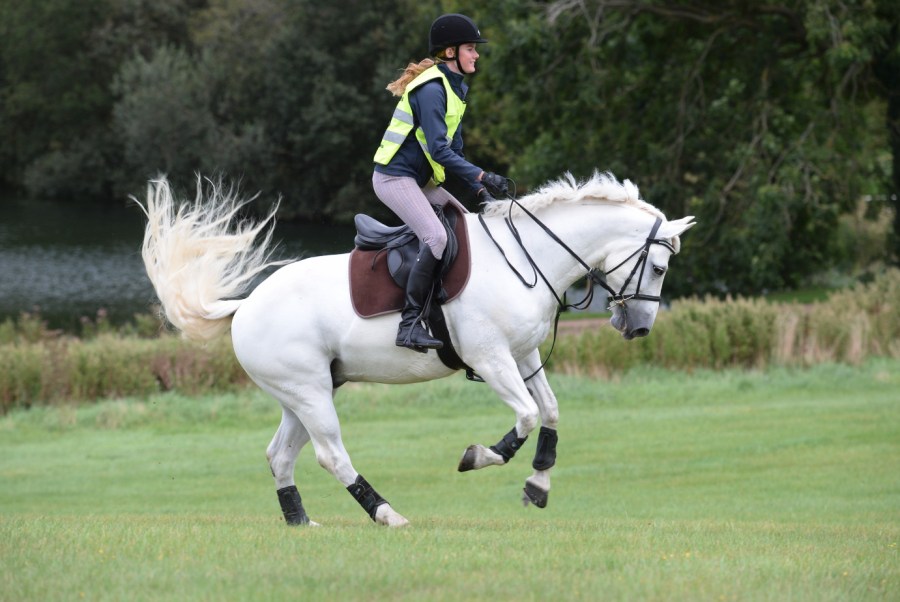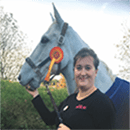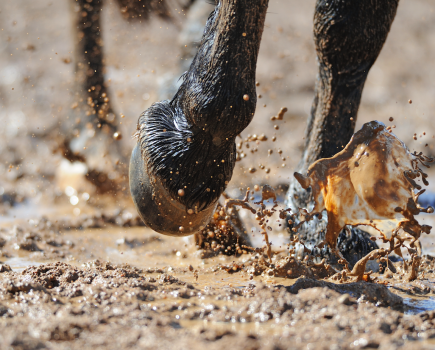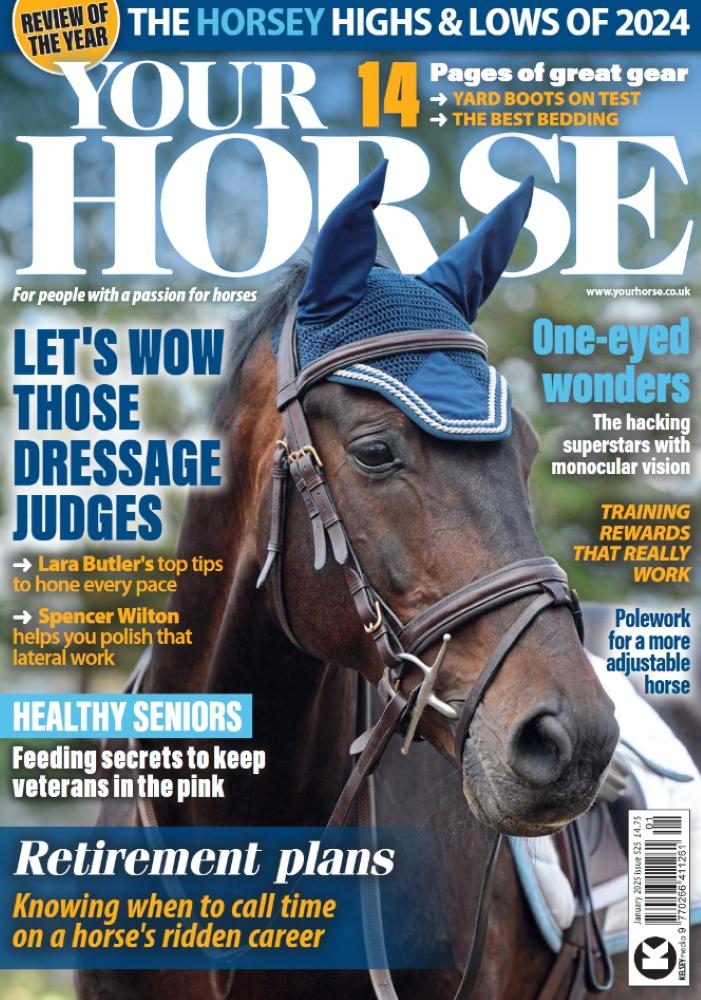Feeding an excitable horse who has a tendency to become hot-headed is a balancing act. You need to provide enough energy through the horse’s diet to fuel the work you are asking them to do, but by generating slow-release energy rather than fizz. The goal of course is to keep them healthy and to be an enjoyable ride, but without feeling too sharp and becoming a handful to ride and handle.
“Eliminating digestive discomfort needs to be a primary concern whenever you are feeding an excitable horse,” states Anna Franklin, equine nutrition advisor at Blue Chip. “Improved digestive health alone can lead to behavioural improvements and new, positive, learned behaviour. Base your horse’s diet around ad-lib fibre, supported by a balanced diet low in sugar and starch, which is also whole cereal and molasses-free and you’ll be on your way.
“Choosing products that include oils, such as soya and linseed, allow your horse to gain condition through slow-release energy sources, limiting the fizzy response. Feeds containing quality protein and probiotics aid gut function too, which can encourage topline and condition in poor doers.”
If you are considering a calming supplement for your horse, Anna recommends doing your research and finding the specific active ingredients that are said to be beneficial when fed for this purpose.
“Some horses respond well to magnesium alone; for others, L-tryptophan targets their behaviour more suitably, whereas herbal remedies work best for others,” explains Anna. “Many calming products have been seen to be beneficial, especially when coupled with good management. Remember to supply ad-lib access to forage to relieve boredom and improve gut comfort. The provision of turnout to limit enthusiastic behaviour and promote a natural release of energy is also vital.”
Consider how much you feed and when
A key consideration when feeding an excitable horse is to make sure you are not giving feeding them too much in general, which is easily done when overestimating the amount of work being done or not changing the horse’s diet when their workload changes. It could be that good quality ad-lib forage and a feed balancer or supplement to provide essential vitamins and minerals — as a forage-based diet alone isn’t usually a balanced diet — is enough to fuel a horse who has plenty of natural energy to use.
“Consistent exercise and training all-year round will help to manage your horse’s behaviour but, when it comes to diet, you need to make sure you’re not giving them too much by overestimating the amount of work being done,” confirms Dengie nutritionist Tracey Hammond.
Some excitable horses may also be described as ‘stressy’ types, which makes it harder for them to keep weight on.
“To help a horse maintain their condition when they are prone to weight loss due to stress, make sure their routine of workdays stays the same and spread their feed and hay throughout the day into several small meals and another when they go in at night,” advises Allen & Page nutritionist Joanna Palmer.
“Along with their feed and hay, using a warm soaked fibre feed each day can help to maintain a horse’s body condition. There are partial fibre replacers on the market that will help boost fibre levels each day, helping to maintain body weight.”
Feed sources of slow-release energy
It’s important to understand that sugar and starch provide horses with quick-release energy, while fibre and oil are slow-release energy sources. Therefore for fizzy horses, keep the amount of starch and sugar to a minimum.
“Oil-based products can have as much energy as a competition mix, providing plenty of energy for working horses but with around 10 times less starch,” explains Tracey. “This makes them particularly suitable for those over-exuberant individuals. Research published in the journal Applied Animal Behaviour Science found that horses fed a fibre and oil-based diet had lower resting heart rates and were less reactive to novel stimuli compared to horses fed the same amount of energy from cereals.”
Independent nutritionist Clare Macleod MSc Nutr echos the advice to avoid feeding too much starch.
“Choose ‘super-fibre’ concentrate horse feeds rather than starchy grain-based concentrate feeds, as some horses become too excitable when eating moderate to high intakes of starch,” says Clare. “Look for feeds containing high digestible fibre and oil, most of which are targeted at endurance exercise, but are just as suitable for all disciplines.
“Make the most of grass in your horse’s field too, as this will reduce the amount of excess starchy concentrates they need to eat. Feed quality forage with an added vitamin and mineral supplement and only add concentrates if your horse can’t maintain weight and condition on forage,” continues Clare. “Watch out for excess weight gain though and beware a low fibre intake if your horse is on well-grazed pasture because they will only be eating grass ‘sprouts’.”
Feeding an excitable horse who competes
Feeding an excitable horse who competes but is a poor doer and therefore requires feeding to support their body condition and energy levels needs to be done carefully, avoiding the fast-release energy that can cause fizzy behaviour.
“Feeds to look for are those that contain quality protein to support the horse’s muscle development, oil to help with condition and stamina, and specialised fibre to support a healthy digestive system, energy for work and body condition,” advises Joanna Palmer. “A high-calorie conditioning feed would be appropriate for a hard-working competition horse as it will provide slow-release energy to fuel their workload, help them gain weight and maintain an ideal body condition score, while not adding to their natural excitability.”
Energy and calories are the same thing
Remember that energy and calories are the same thing, and it is not possible to feed a high-calorie feed to promote weight gain without giving your horse more energy, and so they will need to be worked accordingly. However, it is the ingredients in the feed that are important when it comes to determining the type of energy that is provided and whether the feed could add to a horse’s stressy or excitable nature.
“Look for a feed that is free from ingredients that can cause fizzy behaviour, such as whole cereal grains and molasses, and instead contains fibre and oil-based ingredients to provide slow-release energy. These are ideal for horses with a tendency to be fizzy and excitable,” says Joanna.
“Feeds that contain a high proportion of cereals should be avoided as they will have significantly higher starch levels and will supply fast-release energy. Not only can a high starch diet cause fizzy and excitable behaviour, but it is also more difficult for the horse to digest and can increase the risk of problems such as colic, laminitis and gastric ulcers.”
Love hacking? Join our free #Hack1000Miles challenge and see how far you can go!
Subscribe to Your Horse Magazine – the perfect Christmas gift!










